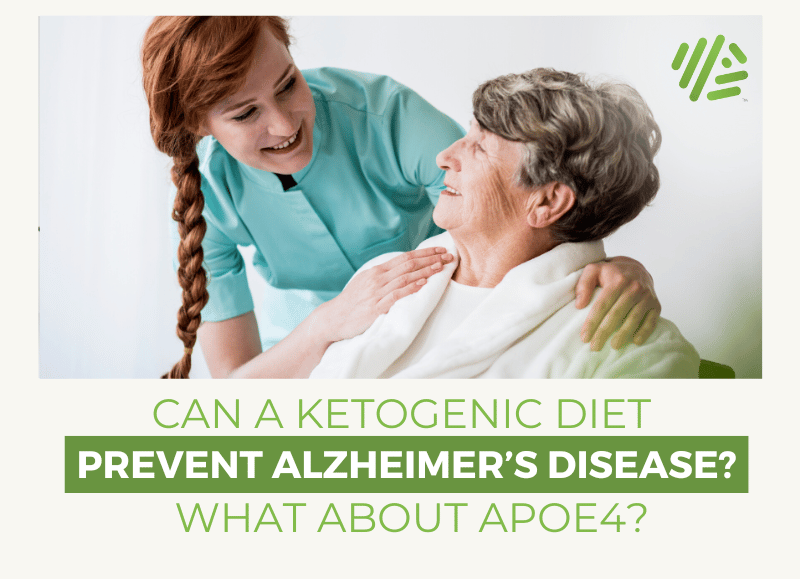Can a Ketogenic Diet Help ApoE4 Carriers?
Article at a Glance
- A ketogenic diet, especially one that is high in saturated fat, is likely a very poor strategy for preventing Alzheimer’s disease in APOE4 carriers.
- A ketogenic diet appears to be potentially beneficial for those with Alzheimer’s (or similar diseases) who do not carry ε4.
- Even when Alzheimer’s disease has developed, ε4 carriers show no benefit from ketogenic interventions.
Genes Mentioned

Contents
We received a question recently from a gentleman who purchased a custom nutrition plan and had a question about the results.
His diet type was assigned as Villager, which due to issues with fat metabolism, is a largely plant-based diet, but he’d heard that a ketogenic diet was an effective way to reduce risk for, or even to prevent, Alzheimer’s disease, and as a carrier of ApoE ε4, he was particularly concerned about which path to take.
We wrote this blog as a reference for future use in case the issue comes up again.

Get Started With Personalized Nutrition
Gene Food uses a proprietary algorithm to divide people into one of twenty diet types based on genetics. We score for cholesterol and sterol hyperabsorption, MTHFR status, histamine clearance, carbohydrate tolerance, and more. Where do you fit?
What is APOE4?
The role of the APOE gene in the development of Alzheimer’s disease is something we’ve covered previously on the blog.
The take-home message is that if you carry two copies of the ε4 isoform of APOE then your risk of developing Alzheimer’s is nineteen times greater. But we should also state that carrying ε4 , even two copies, does not mean you will develop Alzheimer’s. While the association is well established it is not routinely used in clinical diagnoses.
However, in this post, I’m going to try and drill down on one particular issue, namely should ε4 carriers follow or avoid a ketogenic diet.
For those of you who aren’t familiar, a ketogenic diet involves eating large amounts of fat in an attempt to transition the body from burning its preferred fuel source, which is glucose, and instead making it rely on ketones (which are a source of energy produced when the body burns fat, as it does during a fast).
Under normal circumstances, our bodies burn carbohydrate fuel, known as glucose for energy, and it is glucose that powers the brain.
Alzheimer’s and glucose metabolism in the brain
The science behind the idea of using keto diets in the prevention of dementia comes from the hypothesis that the development of Alzheimer’s is driven by a disruption of glucose metabolism in the brain.
Numerous studies have reported that the glucose metabolism is slowed in individuals with Alzheimer’s. There is , the order of effect isn’t entirely understood yet, i.e.,evidence demonstrating this association, but in a chicken and egg situation the order of effect isn’t entirely understood yet, i.e. does Alzheimer’s lead to a reduced requirement for glucose in the brain, or does a reduction in glucose metabolism lead to the development of Alzheimer’s?
Some studies provide some evidence for the latter, but the exact impact remains unclear. 1
If a lack of glucose metabolism can indeed lead to Alzheimer’s then attempts to bypass this limitation are very desirable; enter the ketogenic diet.
As we mention above, ketogenic diets are typically very high in fat, very low in carbohydrates with a small amount of protein since the body can turn protein into glucose. The aim is to induce the body to use fats rather than the preferred carbohydrates as its energy source by converting fatty acids into ketone bodies.
The hypothesis follows that, as the brain is no longer reliant on glucose for energy, its altered metabolism won’t impact on health.
Alzheimer’s vs. epilepsy on keto
This idea isn’t actually as far out as it sounds. In fact, epilepsy was often treated with a high-fat low-carb diet until the development of anticonvulsant drugs.
Its use as a therapy or co-therapy has even begun to increase again in recent years as the ketogenic diet becomes more mainstream and people want to move away from medication. 2
However, just because the ketogenic diet works in epilepsy does not necessarily mean it works in those at greater risk for Alzheimer’s. The recent KETO-CTA study by Dave Feldman and colleagues shows just how high risk a ketogenic diet can be when it elevates LDL-C to dangerous levels.
Noteworthy studies
There are actually quite a few studies looking at the effect of ketogenic diets in various Alzheimer models which are covered in detail in this article.
I’ll briefly go through a few here just to show the effects reported.
Rodent studies
By way of background, substances called amyloid plaques, which form in the brain, are thought to be responsible for the development of Alzheimer’s. In a cell culture model, ketone bodies were shown to have a protective effect against a fragment of the amyloid precursor protein (which is toxic to neuronal cells and implicated in the pathology of Alzheimer disease), and even promoted neuronal growth. 3
A similar positive effect has been observed in several mouse models of Alzheimer’s. The most interesting study demonstrated that mice fed a ketone body precursors showed significantly less amyloid and tau deposition in the brain, and also improved learning and memory responses, compared to those on a more traditional carbohydrate based diet. 4
Human studies
In humans, several small clinical trials have been carried out in individuals with Alzheimer’s or similar disorders. An MCT supplement was able to increase plasma ketone bodies in patients with Alzheimer’s, which correlated with an improved cognitive score.
MCT oil and ketone supplements for Alzheimer’s and ApoE status
Interestingly, this effect was only seen for ApoE ε4 negative patients, those who were ε4 carriers saw no positive effect with MCT oil supplementation. 4
A similar effect was seen when a specific ketogenic drug was administered, whereby those who were ε4 negative saw a positive effect but ε4 positive individuals did not.5
Caution: So, based on this evidence, it would appear that a ketogenic diet can have benefits for those already suffering with Alzheimer’s, but, and this is a big but for purposes of this blog post, those with ApoE ε4 don’t get the benefits and should avoid the diet.
Can a ketogenic diet prevent development of Alzheimer’s?
There is currently no evidence to indicate the ketogenic diet can prevent Alzheimer’s disease.
The mouse work and early human studies are certainly positive, and there are in fact several clinical trials ongoing (no data reported yet) looking into this effect. 6 7 8 9 1011
Of these studies two are particularly interesting as they could potentially answer the impact of a ketogenic diet in those at risk, but who currently don’t have Alzheimers. 76
So what’s stopping everyone jumping on board the ketogenic diet, especially those who are ε4 positive?
Well firstly, the lack of response in ε4 positive individuals is quite striking. The simple answer may be that the dietary interventions described didn’t last long enough to see an effect in this population, another potential is that the symptoms are more severe in these individuals and so cannot be rescued by a ketogenic diet.
We simply don’t know at this point.
The role of LDL
- Elevated LDL cholesterol (and lowered HDL) and other blood lipids may be associated with an increased risk of developing Alzheimer’s or associated disorders in later life,12131415 although this is in itself unclear as trials targeting LDL through statin intake were inconclusive.1617
- This is alongside the other potential health risks associated with high-fat low-carb diets in some people.
- For some, the ketogenic diet could do some very bad things to their lipid markers, which would appear to put them at increased risk for developing Alzheimer’s.
- Elevated LDL-C and ApoB are associated with significant increase risk for early onset Alzheimer’s (EOAD) and Alzheimer’s in general.
People who deal well with a ketogenic diet may in effect nullify their APOE type, whereas those who don’t deal well with such a diet may actually end up increasing their risk. The way to differentiate would appear to be to know how your body metabolizes fat.
In other words, are you someone who sees a big spike in metrics like LDL-P when on a high fat diet? If so, the ketogenic diet is more likely to be dangerous, especially in APOE4 carriers where the ketone benefits aren’t established.
If however, you can handle a higher fat diet and keep your LDL-P in range, the ketogenic diet may offer some protective effects. From a genetic standpoint, the response to a high fat diet is one of the things we try to gauge with our custom nutrition plan product. Our higher fat diet types, like Urban Grazer and Mosaic, or even California Keto, may stand to benefit from a ketogenic diet in some cases, whereas the Lean Machine, Villager, Wyoan and Okinawan diet types would likely be at increased risk.
Key takeaways
If you’re looking for some key takeaways/rules, what follows is a good outline to keep in mind:
- A ketogenic diet appears to be beneficial for those with Alzheimer’s (or similar diseases) who do not carry ε4.
- For those with Alzheimer’s, who also carry ε4, no beneficial effect was seen (but this may be due to small sample size).
- For those without Alzheimer’s, elevated LDL cholesterol and APOE-ε4 infer an increased risk for developing dementia, so know your numbers. A poor lipid profile is also a marker for developing Alzheimer’s.
- There is currently no information about how a ketogenic diet will impact those at increased risk, the issue really comes down to the latest science on heart health. if you’re on a ketogenic diet and your LDL-P spikes, you’re not helping yourself.
If we had to end the post with one overarching rule for APOE4 carriers, it would be this: once Alzheimer’s is already present, APOE4 carriers may benefit from a ketogenic diet. However, a ketogenic diet, especially one that is high in saturated fat, is likely a poor strategy for preventing Alzheimer’s disease in APOE4 carriers.

Get Started With Personalized Nutrition
Gene Food uses a proprietary algorithm to divide people into one of twenty diet types based on genetics. We score for cholesterol and sterol hyperabsorption, MTHFR status, histamine clearance, carbohydrate tolerance, and more. Where do you fit?




Great article!!
I just found out that I am ApoE 2/4 and I’m starting to do research on this.
I’m 64 with no signs whatsoever of Alzheimers and no one in my family has ever had Az. I do have some arterial plaque as a calcium scan revealed a score of 226. Also, all of my blood relative, uncles & aunts and father, lived into their upper 80’s and beyond.
My Chol total is around 200, my HDL is 47, my trigs are 58, but my LDL-C is 120.
I’m low sugar & low carb & I’m 6’1” & 190lbs. My doc says that with E2/4, that a keto diet isn’t for me.
What does the research show as the best diet for someone that is ApoE 2/4?
Thanks,
John
While on Keto diet 3 months, I have lost 27 lbs. I’m hypothyroid and that in itself is amazing.My blood tests have not shown raise in Ldl.
When you use stored fat as fuel, the cholesterol stored in your fat will end up in your bloodstream. It’s hormonal. Perhaps when a person chooses to increase carbs on a keto diet, the Ldl levels will change.
I am homozygous APOE4 and experience better cognition on a cyclical ketogenic diet supplemented with C8 MCT-oil.
Worth mentioning though is that I don’t eat a lot of cholesterol and saturated apart from MCT-oil and my LDL-C is 70 mg/dl, ApoB 69 mg/dl and Lp(a) 14 mg/dl.